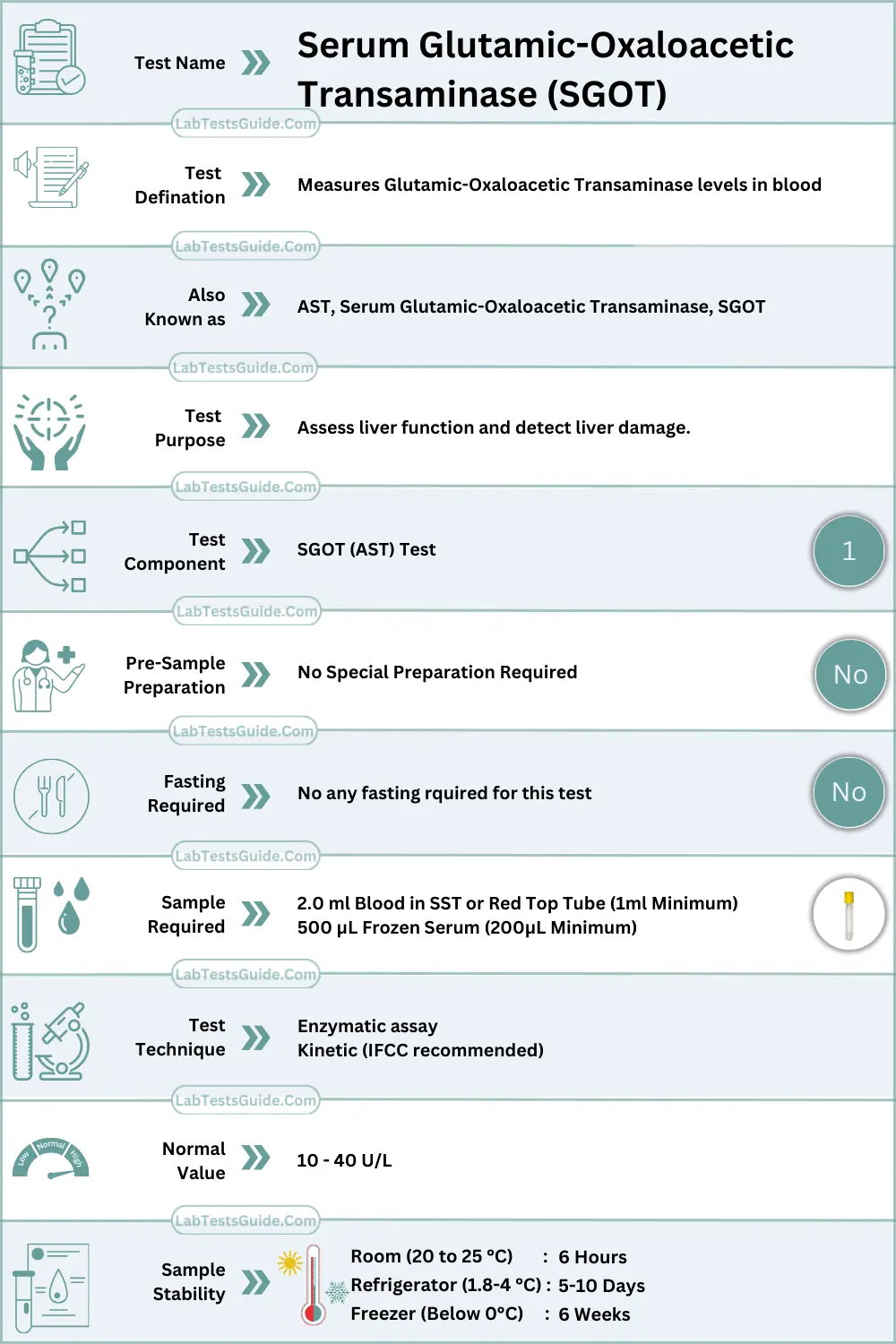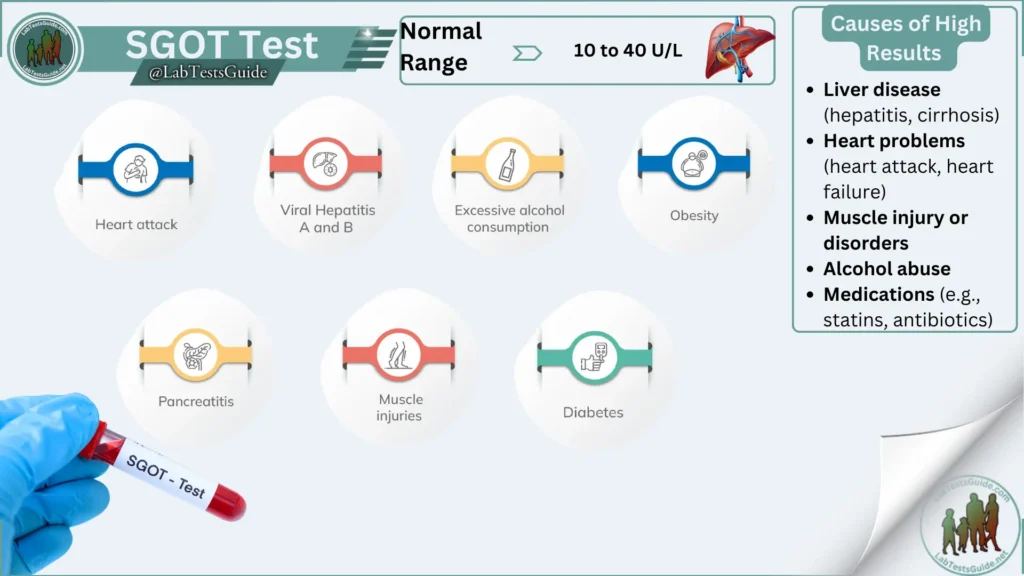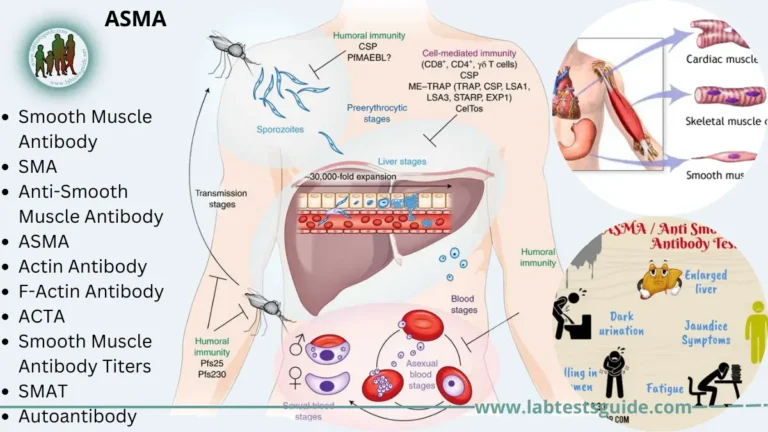Glutamic-Oxaloacetic Transaminase (AST) is an enzyme that helps metabolize amino acids. Like ALT, AST is normally present in blood at low levels. An increase in AST levels may indicate liver damage, disease or muscle damage.

Also Known as : AST, Serum Glutamic-Oxaloacetic Transaminase, SGOT, GOT, Aspartate Transaminase, ASAT
Test Panel: Total Bilirubin, Conjagated Bilirubin, Unconjugated Bilirubin, ALT, AST, ALP, Total Protein, Albumin, Globulin, A/G ratio, GGT,

Why Get Tested :
The AST test is often recommended in the following situations:
- SGOT diagnose any kind of liver disease.
- This also helps in heart diseases to diagnose acute myocardial infarction.
- to check for damage from liver infections, such as hepatitis B and hepatitis C
- SGOT has done for follow up of the patient on treatment.
- SGOT is done in routine in patients on chemotherapy.
- SGOT may be advised in a patient with treatment on antituberculous treatment.
When to Get Tested :
- if you already have a liver disease, to monitor the disease and how well a particular treatment is working
- if you any Heart Disease
- if you’re experiencing the symptoms of a liver disorder
- if you have certain medical conditions such as high triglycerides, diabetes, high blood pressure, or anemia
- if you drink alcohol heavily
- if you have gallbladder disease
When SGOT Test Orderd :
A liver panel, or one or more of its components, may be ordered when someone is at risk for liver dysfunction. Some examples include:
- People who take medications that may potentially damage the liver
- Those who are alcoholics or heavy drinkers
- Those who have a history of known or possible exposure to hepatitis viruses
- Individuals whose families have a history of liver disease
- People who are overweight, especially if they have diabetes and/or high blood pressure
A liver panel may be ordered when a person has signs and symptoms of liver disease; however, most people who have liver disease do not have any of these symptoms until the disease has been present for many years or is very severe. Some of these include:
- Weakness, fatigue
- Loss of appetite
- Nausea, vomiting
- Abdominal swelling and/or pain
- Jaundice (yellowing of eyes or skin)
- Dark urine, light-colored stool
- Itching (pruritus)
- Diarrhea
Usually no one single set of liver tests is used to make a diagnosis. Often, several liver panels will be ordered over a few days or weeks to help determine the cause of the liver disorder and evaluate its severity
Sample Required
- This is done on the serum of the patient.
- The random sample can be taken.
- The serum is stable for 24 hours at Room temp. and 28 days at 4 °C.
Precaution For Sample
Normal value :
| Age | Male U/L | Female U/L |
| Newborn to 1 Year | 20 to 65 | 20 to 65 |
| More then 1 Year | 10 to 40 | 10 to 40 |
Increased SGOT level seen in:

- Fulminant type of hepatitis especially viral type.
- In liver cell necrosis or injury like chronic hepatitis,
- Alcoholic hepatitis.
- liver metastasis and Hepatoma (increase may be 5 to 10 folds and is of both enzymes).
- In necrosis of heart muscle or skeletal muscle e.g acute myocardial infarction.
- Severe exercise.
- Severe burn.
- Hypothyroidism ( in 40 to 90% of cases).
- In cholestatic and obstructive jaundice.
- May see a transient increase in acute pancreatitis, acute renal diseases, musculoskeletal diseases, or trauma.
- Other diseases than liver and heart which can increase the level:
- Hypothyroidism.
- Dermatomyositis.
- polymyositis.
- Gangrene.
- Toxic shock syndrome.
- Shock.
- Mushroom poisoning.
- Pulmonary embolism and infarction.
- Hemolytic anemia.
- malignant hyperthermia.
Decreased SGOT level seen in:
- Chronic renal dialysis.
- Acute renal diseases leading to Azotemia.
- Vit.B6 deficiency.
- Beriberi.
- Pregnancy.
Related Tests:
Theses tests to be tested in Liver Function Tests (LFT’s) :
- Total Bilirubin
- Conjugated Bilirumin
- Unconjugated Bilirubin
- ALT (SGPT)
- AST (SGOT)
- Alkaline Phasphatase
- Total Protein (TP)
- Albumin
- Globuline
- A/G Ratio
- Gamma GT (GGT)
Possible References Used



